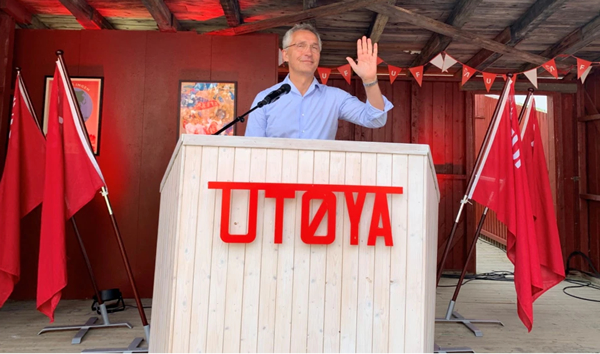
General Jens Stoltenberg said Thursday the Western military alliance has the joint tasks of both supporting Ukraine in its fight against a Russian invasion and to prevent the conflict from spreading into a war between Russia and NATO.
Speaking to a summer camp in his native Norway, Stoltenberg said NATO has a moral responsibility to support Ukraine and the Ukrainian people who have been subjected to a war of aggression.
“We are seeing acts of war, attacks on civilians and destruction not seen since World War II,” Stoltenberg said, according to a NATO release of his prepared remarks. “We cannot be indifferent to this.”
Stoltenberg said the world will be a more dangerous place if Russian President Vladimir Putin gets what he wants through the use of military force.
“If Russia wins this war, he will have confirmation that violence works. Then other neighboring countries may be next,” he said.
Ukraine’s military said Thursday that Russian forces were shelling multiple areas in Ukraine, including those around Kharkiv, Slovyansk and Chernihiv.
Meanwhile, Britain’s Defense Ministry said Ukrainian forces were using missiles and artillery attacks against Russian “military strongholds, personnel clusters, logistical support bases and ammunition depots.” A ministry statement said such attacks were likely to have a high impact on Russia’s efforts to resupply and support its forces.
More grain ships to sail Friday
Also on Thursday, the Joint Coordination Center (JCC) that is overseeing implementation of the U.N.- and Turkish-brokered deal to get commercial ships with Ukrainian grain to world markets said three more ships are expected to sail on Friday.
The first ship, the Razoni, departed on Monday from Odesa and is enroute to Lebanon with a cargo of corn.
The Navistar will be the second vessel to sail from Odesa, carrying 33,000 metric tons of corn destined for Ireland.
The JCC, which is made up of representatives from Ukraine, Russia, Turkey and the United Nations, has also authorized the departure of two ships on Friday from the port of Chornomorsk. The Polarnet, will carry 12,000 metric tons of corn heading to Karasu, in northwestern Turkey, and the Rojen, which is carrying more than 13,000 metric tons of corn. That cargo is headed to Britain.
The total of 58,000 metric tons of grain is a small fraction of the more than 20 million metric tons in Ukrainian silos and on commercial ships waiting to leave the country. The U.N. says there are about 28 ships waiting to depart Ukrainian ports.
The JCC has also authorized the movement, pending inspection, of the Fulmar S, to enter the port of Chornomorsk. The ship is anchored at the center’s inspection area near Istanbul.
The vessels are scheduled to leave early Friday, but the JCC says departures could be impacted “by readiness, weather conditions or other unexpected circumstances.” The vessels’ crew and cargo will undergo checks when they arrive at the inspection area in Turkey’s territorial waters.
The JCC says that based on its experience with the first ship that sailed on Monday, the Razoni, it is now testing moving multiple ships in the safe corridor, both outbound and inbound.
The Ukrainians mined their part of the Black Sea to protect their territory from Russian attacks. The U.N. said its experts determined early on in planning for the movement of grain not to attempt to de-mine the area, because it could take between three and five months, too long as food prices soar globally. Instead, safe lanes have been determined and the commercial vessels are to strictly adhere to them.
The JCC says the safe corridor has been revised “to allow for more efficient passage of ships while maintaining safety.”
There is a backlog of ships that have been stranded in Ukraine’s southern ports as a result of the more than five-months-long war. The JCC says the ships need to move out to free up space for other ships to enter the ports so they can collect and transport food for export to world markets, as the July 22 Black Sea Grain Initiative envisages.























